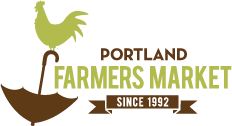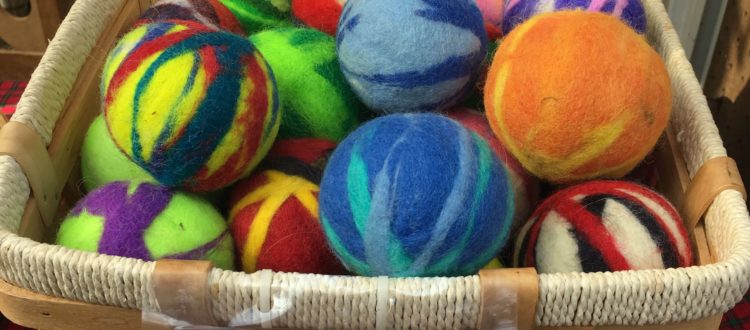SuDan Farm’s Amazing All-Purpose Sheep
If you have circled the PSU Market park block loop on a Saturday morning over the last 15 years, you may have noticed a booth standing out among the crowd. You know, the one with displays of long-locked sheep skins, colorful hand knit accessories strung along the canopy edge, and large coolers filled to the brim with fresh cuts of lamb. More than likely, you stepped a little closer and spotted a woman sitting behind a spinning wheel.
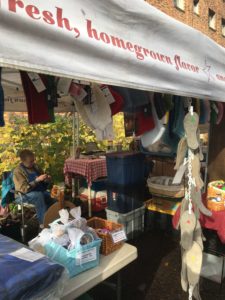
Susie spinning her flock’s fibers into wool
Meet SuDan Farm
Susie spinning her flock’s fibers into wool
Susie and Dan Wilson of SuDan Farm are a long-time vendor at our PSU Market. They produce grass fed, locally grown, and locally processed lamb, pastured poultry, pastured chicken/duck eggs, and fiber items made from the wool of their sheep. The Wilsons love their line of work – especially being at the farmers market. Together with their main farmhand and booth helper, Ashley, SuDan Farm serves shoppers with every ounce of warmth that their sheep provide.
Finding Their Paths
With a world of agricultural history aiding her fiber-spinning fingertips, Susie is an enthusiastic sheep raiser, shearer, and fiber crafter. Having grown up in a family of DIY-ers in Eastern Iowa, at the age of five she began dreaming of having her own farm to bring her crafting passion full circle. In May 1990, despite other educational and career path opportunities, Susie enrolled in a sheep shearing school at Oregon State University, and her dreams of coming home filthy and sore from sheep wrangling became a reality.
Without a doubt, Dan is the man for lamb. He has the know-how and wherewithal to oversee every aspect of their sheep’s lives. From a large ranch in Arcata, Calif., farming and ranching are in his blood. After spending time in the military after high school, he returned home to continue farming orchards of apples and hazelnuts near Salem, Ore., and attend school. It was during his time at Oregon State University that Dan wound up in a butchering class that set his path firmly towards sheep.
Paths Crossed
Susie and Dan met at a dinner in the Fall of 1990 and married in February 1991. Their lifelong dream of raising a flock was humbly fulfilled on a rented farm in Hillsboro with only six sheep to keep Susie shearing, showing, knitting, and spinning her fibers into wool. Business blossomed over the following years, and they saw an avenue in direct marketing when Lake Oswego Farmers Market opened in 2001. With the support from friends and colleagues, SuDan Farm was accepted into Lake Oswego’s market and began their farmers market journey with six coolers of lamb, Susie’s spinning wool, and two bags of raw fiber.
Farmers Market Journey
From the beginning, SuDan Farm filled a critical role for local area farmers markets. Fresh produce and value-added products are expectedly abundant at farmers markets, but ranchers offering animal products are a little harder to come by. Since securing a spot as a reliable source for lamb, wool, and wool accessories, Susie and Dan have made it their business model to fill the gap enthusiastically. In their early days at market, Susie shared that customers would ask for things not available so “we would just say yes and then go figure it out!” Today, they offer the most delightful array of wool products and an impressive menu of meats.
“We have the most lamb and the best lamb. By coming to the farmers market, you can talk to the people who grow it. You can talk to the people who know how to cook it and serve it.”
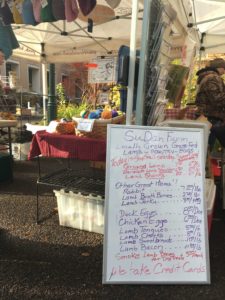
SuDan Farm menu
On the Farm
Raising a flock of any size is no small task. At their farm located just outside of Canby, Oregon, they keep a breeding flock of around 30 ewes. These ewes are primarily Border Leicesters with some Coopworths and Gotlands. SuDan Farm’s meat animals reside mainly in the upper Willamette Valley. Whether raised for breeding or heading to the butcher, each sheep has to be sheared of their long wool coats. In our drizzly climate, adults are sheared twice a year; “once right before lambing and then right before breeding,” Susie explained. However, every ounce of wool is worth the grime and a sore body. Everything their sheep provide has a purpose and will find a way to the farmers market.
The Amazing All-Purpose Sheep
Sheep are extremely practical. As one of the oldest domesticated animals in history, it’s no wonder sheep have a proud reputation! Susie is proud of the “5,000-year-old miracle fiber” and Dan is proud of the extensive meat offerings. Considering every step of the process, they should be proud of all their work!
With the help of local mills, butchers, and cutting facilities, SuDan Farm sends their cultivated materials to trusted facilities for further production. Susie shears every sheep and then soaks the fibers to rid them of weight and lanolin, the oil secreted from the sebaceous glands of wool-producing animals. She ships the fibers to eight different mills in the Northwest where they will be washed and carded. Carding wool involves a process of detangling and straightening wool fibers. Once milled, wool is then ready to become simple roving suitable for spinning (cue Susie’s wheel), sheets of needle felt for shoe insoles, or other felted items like balls for juggling, dryer balls, and cat toys.
SuDan’s felt insoles are by far their most popular wool product. Using 200-300 pounds of felt a year, insoles are a favorite among shoppers and vendors (including Susie and Dan who wear them year-round!).
As for their extensive menu of meats, Dan oversees the processing of each sheep. Their flock is butchered at a USDA facility in Brownsville, Oregon. Carcasses hang five-to-six days for aging and are transferred to a cutting facility in Mount Angel, Oregon. Dan visits the cutting facility every Monday and helps with the cutting process.
Afterwards, lamb skins are salted and sent to the closest available tannery in Wisconsin. After a four-to-five month process, sheepskins are ready for market. SuDan Farm tans around 300 every year, but could easily sell twice as many. These long-locked skins are not only scrumptiously soft, but they’ve also been tanned for washability (no dry cleaning necessary!).
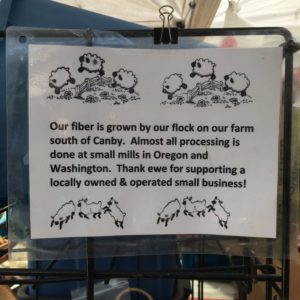
SuDan signage
Beyond the Market
While direct marketing helped their business flourish both in retail and wholesale realms, being at the farmers market has brought them more than business. By welcoming (and attracting!) all conversation, their enthusiasm has spread into a web of partnerships, mentoring relationships, and friendships. Whether one is interested in the wheel Susie uses to spin her yarn or seeks farming opportunities, Susie said she will talk to people about wool and agriculture “endlessly!”
“The real magic of our market experience is explaining where wool comes from to help people see the connection to the earth and sun that raise our animals who provide us with so many useful things,” she said.
Susie also holds a wealth of knowledge when it comes to the local and national craft and fiber arts scenes. She always carries informational fliers about fiber festivals, local knitting guilds, and resources for learning to spin, knit, and crochet. In addition to on-the-spot spinning demonstrations, Susie is happy to answer knitting questions – she knows about needle sizes, gauge, and yardage requirements by heart!
So if after all these years you have not stepped into the SuDan Farm booth, don’t be sheepish. You can find them at PSU market every Saturday (except for the weekend of Oregon Flock and Fiber Festival at the end of September). You’ll be glad you did.
